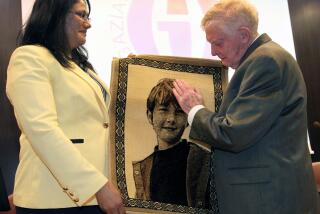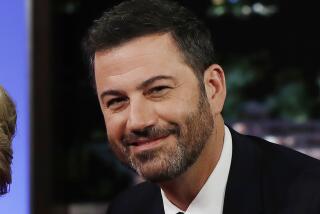Twin With New Heart Is Improving
- Share via
Nick Draper, the 7-month-old identical twin who struggled to live after receiving a transplanted heart last week, has improved so much that doctors at UCLA Medical Center closed his chest in a short operation Friday morning.
Doctors considered the procedure a major milestone, one made possible because Nick’s new heart is now working normally and his prognosis for recovery is good. His twin, however, still needs a new heart.
After an arduous, early morning transplant operation Feb. 16, Nick’s new heart failed to beat strongly or rhythmically. Fearing that the organ was being rejected and that the baby would die on the operating table, doctors connected Nick to a bypass machine that helped circulate his blood and keep him alive.
While Nick’s new heart steadily grew stronger this week, enough so that doctors took him off the machine, his chest remained open in a 4-inch-long, almond shaped incision. It made the baby susceptible to deadly infection.
By midweek, however, Nick’s doctors at UCLA’s Mattel Children’s Hospital felt increasingly confident. Tests showed the heart was beating well and needed little help. Doctors decided to close his chest, which would have been the last step in the transplant operation itself had it gone as planned.
During Friday’s hourlong procedure, Dr. Mark Plunkett, Nick’s surgeon, attached strands of thin wire to both sides of the baby’s chest and pulled his ribs together. He then stitched up the surrounding skin.
Tests of Nick’s new heart showed it was beating more efficiently than most hearts. Nick’s former heart pumped less than a quarter of the blood it should have with each pulse.
Doctors believe the transplanted heart struggled at first because it took an unusually long time -- about eight hours -- to bring it to Los Angeles. The donor’s name, residence and cause of death are confidential under the law.
Over the coming days, Nick probably will be taken off the sedatives that have kept him asleep almost continuously since the operation. Doctors also plan to remove a breathing tube from his throat and to wean him off powerful drugs that have fueled his heart since shortly after birth.
Friday’s operation brought joy to Nick’s parents. “He’s on his way,” said Nicole Draper, Nick’s mother. “We’re just so encouraged. Wow. We feel like he has jumped over a major hurdle.”
But Nicole said the happiness was tempered by the condition of Nick’s twin, Nate, who was recently transferred to an intensive care ward at UCLA because he is faring poorly. Doctors have said he needs a new heart as soon as possible.
Mike and Nicole Draper, Phoenix residents, moved here after Nick and Nate were born in order to be close to UCLA -- known for its heart care and transplant program.
The twins suffer from dilated cardiomyopathy, a rare disease that malforms the heart. Nick received the first transplant because he was put on the waiting list first. At the time, Nate was too sick to go on the list.
Even with transplants, the twins’ futures are uncertain. Heart transplants have become common only over the last two decades, and the science is evolving. Rejection occurs with all transplants eventually. Sometimes it causes fatal heart attacks.
Doctors at UCLA note that advances in medication have helped the hearts they transplant last about 10 to 12 years before being rejected.
Plunkett, who has performed almost 300 heart transplants, said the fact that Nick’s new heart is beating so strongly won’t affect how long it lasts. But he added that he expects advances in medication, and cutting-edge science such as gene therapy, to increase the time that transplanted hearts such as Nick’s remain healthy.







